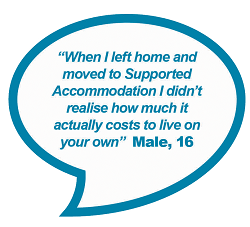Where the young person cannot stay at home or it is deemed unsafe for them to do so, there are some alternatives to consider. Homelessness at a young age should be avoided wherever possible.
The parents of, or those with parental responsibility for, 16 and 17 year olds are responsible for their children's welfare.
If you have told your child/young person to leave and they have nowhere else to go they will have to go to any agency (i.e. Housing, Children's Services, Inspira) in their area to ask for help.
There are certain processes we will need to follow to make sure your young person is getting the right support. In order to do this, we will need to complete some assessments. For a 16/17 year old, who is homeless, one of these assessments will be completed by a Social Worker.
The Agency will follow the protocol to get in touch with the relevant person and possibly make a referral to a service called 'Nightstop'. Nightstop works with homeless young people between the ages of 16 and 24 who find they have nowhere to stay that night.
The project aims to offer emergency accommodation in the homes of volunteer 'hosts' who provide a safe environment along with an evening meal, breakfast and washing facilities. View the host profiles. It is not guaranteed that each young person will be accepted to use Nightstop, they must go through a thorough risk assessment before being considered.
The parents of, or those with parental responsibility for a child who is 16 or under, are responsible for their children's welfare.
There are no supported accommodation options available for young people who are under 16. However, if they are 16 plus, they can apply for supported accommodation, if they are unable to remain in the family home or within the wider family network. Remember, supported accommodation is ONLY for young people who are homeless, have nowhere else to go and could not manage living alone without support. If they have nowhere to stay 'that night' there are details of emergency accommodation below.
There are certain processes we will need to follow to make sure your young person is getting the right support. In order to do this, we will need to complete some assessments. For a child aged 16 or under, who is homeless, one of these assessments will be completed by a Social Worker.
Supported Accommodation is a housing scheme which offers accommodation, support and training as a package. It is designed to allow people to live independently while teaching them independent living skills, such as cooking, cleaning and paying bills.
Supported Accommodation is meant for vulnerable young people who are homeless, genuinely have nowhere else to go and who would not manage living on their own so would require support.
Any young person living in supported accommodation will be allocated a Support Worker/Independent Living Worker who will work with the young person on a one to one basis to support them and deliver tenancy training. Engaging in this support is a requirement of a supported accommodation tenancy and is non-negotiable.
The parents of, or those with parental responsibility for a child who is 16 or under, are responsible for their children's welfare.
There are certain processes we will need to follow to make sure your young person is getting the right support. In order to do this, we will need to complete some assessments. For a child aged 16 or under, who is homeless, one of these assessments will be completed by a Social Worker.
Homestays can offer a home environment for young people aged 16 to 17 who are open to a Social Worker or Care Leavers aged 16 to 25. Young people stay in the homes of providers who provide support of 7 to 10 hours per week with a view to teaching independent living skills. Eligible young people should be open to a Social Worker and the Social Worker can look into Homestays as an option.
If it's a private tenancy your young person will need to consider a deposit, which is usually 1 month's rent plus another month's rent in advance.
Utility bills such as gas, electricity, water rates, TV licence and council tax, not to mention food, will have to take priority and will take up the majority of their money; if not all of it! After all this, they won't be left with much general spending money.
The Housing Team at your local Council office is a good starting point to find information on renting in the private sector. Contact details for each area below:
Barrow BC - Landlord and Tenant Information
To live in Supported Accommodation or private/Council tenancies can be expensive, as outlined above. A young person can make a claim for benefit but there are rules and restrictions about this and not everybody is eligible.
Also if their benefit claim is successful they have to stick to the strict rules or they could be 'Sanctioned', which means their money can stop for a period of time, causing problems with their rent, bills etc and affecting their tenancy.
If a young person ends up being evicted from their accommodation it may prevent them from accessing other accommodation in the future.
Remember; you are responsible for your child/young person... If it's safe and appropriate to do so, it's always best for the young person to stay at home. Whatever happens, they will need your help and support.
